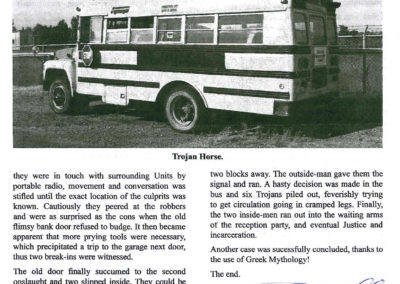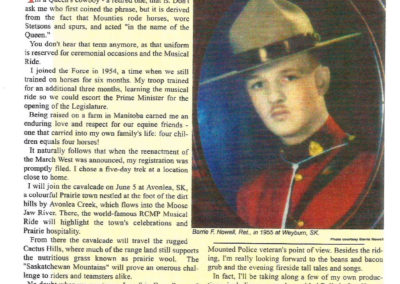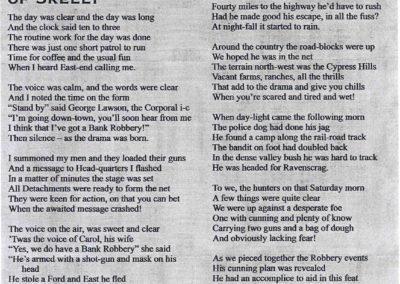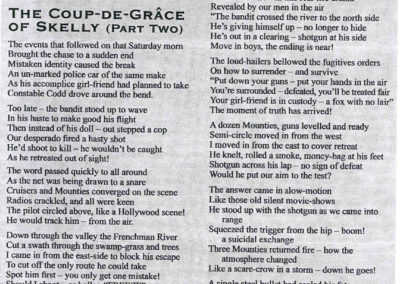Barrie Franklyn Nowell
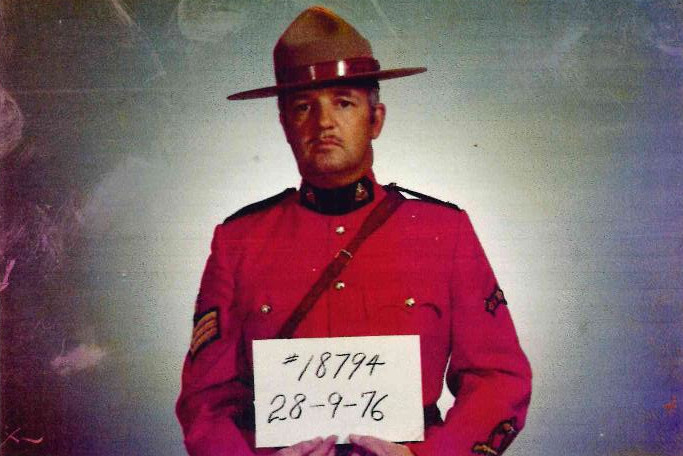
Home Town: Winnipeg, Manitoba
Training Division: Depot
Troop: TR. L 1954-55
Regimental Number: 18794
Divisions Served: “F”
Pillar Location: Pillar VII, Row 11, Column D
Story:
When I was born in the Children’s Hospital in Winnipeg, Manitoba, November 4th 1935, my mother’s sister May Pettit also gave birth to a son Leonard, on the same day, at the same hospital, and thus we were always deemed to be “brothers.” When I was four years old, our family moved to a farm at Anola Manitoba, where I grew up with a love for the outdoors, where I learned to shoot a .22 rifle and hunt prairie chickens and deer to supplement the food on our table. As I grew older, I read the prairie newspaper which published the stories of “King” of the Royal Mounted Police. Then, when I was fifteen years old, I wrote to the RCMP in Winnipeg requesting information on joining the Force. I subsequently received the booklet entitled “A Career in Scarlet,” which was a complete informative document that I valued and kept in my possession to this day.
When I completed my education, my first employment was with the CNR at the Fort Rouge shops in Winnipeg in the clerical departments. When I turned eighteen years old, I applied for an RCMP job and was accepted, and as a result took my first train trip to Depot for training. As I had farming experience with horses, I excelled at equitation that was planned for six months, after which my squad took an additional three months of the Musical Ride to enable us to escort Prime Minister Louis St. Laurent from the Saskatchewan Hotel to the Legislature for the opening of Parliament in November, 1955.
My first posting after training was to Weyburn, Saskatchewan, on city and rural policing when the oil energy discovery business was at its peak, resulting in heavy traffic and highway construction. I was therefore involved in the investigation of a two vehicle collision resulting in nine fatalities. One of the RCMP’s traumatic duties was the notification to families when their next of kin are victims of violent circumstances.
My next posting in 1957 was to Regina Highway Patrol during which time we patrolled to Prince Albert, Saskatchewan, where we had the pleasure of escorting Princess Margaret during her Royal visit to the Prince Albert National Park, a beautiful tourist destination. On my return to Regina, I had the pleasure of arranging my regimental marriage to my future wife Patricia. This occasion was embellished by the presence of six lance bearers in scarlet uniforms who formed an archway for the newly-weds on exit from the church. As was usual at that time, a change in status resulted in a transfer to a City posting, which was Yorkton, Saskatchewan. Two years later we were the proud parents of two children, and a transfer to Langenburg, Saskatchewan.
The investigation of a fatal collision between a drunk driver and an old man driving a horse and buggy on a rural road, led to a notable Jury trial court case and conclusion. The car driver left the scene and tried to destroy court evidence by setting his vehicle on fire. A witness accompanying the accused gave false evidence at a trial regarding the location of the cause of damage. As a result, the Judge and Jury presiding at Court in Yorkton arranged to travel to the Calder district and I was required to identify the scene & other factors in question, after which the accused was convicted.
In 1962 I transferred to Regina RCMP HQ on the plainsclothes section of the Passport and Visa Fraud Section investigating Chinese Immigration violations. Offenders who were charging excessive fees for illegal Passports, were prosecuted, but individuals who only had false Passports were allowed to acquire citizenship in five years. We were assisted by Hong Kong Police who were employed in Canada as translators and interpreters.
In January 1965, I was transferred in charge of the RCMP detachment at Blaine Lake, Saskatchewan, where I received my promotion to Corporal. It was the original location of the migration of Doukabours from Europe and Russia, and were found to be industrious farming citizens.
I remained in Blaine Lake into 1967, which proved to be a challenging year as my family and I attended the Exposition (EXPO ’67) at Montreal, Quebec. While we were in Montreal, a youth from my Detachment area was released from the Mental Hospital in North Battleford and murdered nine members if the Peterson family at Shell Lake, Saskatchewan (The Shell Lake Massacre). I later found that the murder weapon, a .22 caliber rifle had been stolen from a farmer in Marceline, Saskatchewan.
In 1968 I was transferred in charge of a five man detachment at Shaunavon, Saskatchewan. The area was on the fringe of the Cypress Hills, and was populated by cattle farmers and large ranches. The nearest RCMP detachment was Eastend, approximately fifteen miles away, and the member in charge was Cpl. George Lawson, who was in the process of moving to Port Alberni, BC, in June 1970.
At approximately 3:00pm, I received a police radio call from George advising that he had just received a phone call from the Bank Manager reporting a robbery by a masked man armed with a shotgun. The culprit stole the Manager’s bank pistol and a bag of money, then left and commandeered a car from a female customer and made his getaway. I directed my men to set up road blocks and then ordered an observation aircraft to monitor the Eastend area. I then assisted Lawson at Eastend to organize a search party as we learned that the suspect had shot one of our members, then disappeared into the area of the hills, dense bush, and the Frenchman River. The search continued overnight and into the following day. We then encircled the suspect when he moved into an open pasture area, and we warned him to surrender and drop his weapons. Instead, he sat and rolled a cigarette, then stood up with the shotgun and fired from the hip. Three of our members returned and the suspect, whom we had identified as Skelly, fell to the ground mortally wounded by a shot through the neck.
I eventually wrote up a detailed full poem of this case. (Please note poem is located in additional images)
In 1972 I transferred to Lanigan, Saskatchewan, which was experiencing an increase in traffic and population due to the development of a new Potash Mine at Colonsay district Saskatchewan. Two district towns, Leroy and Nokomis were also serviced by Contract with the Lanigan Detachment. In 1973 I was transferred to a city Detachment at Melville, Saskatchewan, which was the 100th anniversary of the Force, and was requiring public celebration activities. In 1974 I was transferred to Swift Current City Detachment where I received my promotion to Sgt.
In 1977 I transferred in charge of North Battleford Highway Patrol and Air Traffic Patrols were instituted on heavy traffic Highways. An RCMP Officer accompanied the pilot and observed the traffic from above and passed by radio the description and speed or other driving offence of a vehicle to an interceptor police car positioned below. This method of observation would detect multiple traffic offences such as speed (by stop watch), and dangerous or drunk driving. The offending vehicle was kept in sight until stopped by the interceptor and identity established.
On a night patrol accompanied by one of my constables, we had occasion to stop a vehicle that was missing one headlight. The auto was occupied by two males who were subsequently identified as C and F (last names omitted), and were travelling from North Battleford to Saskatoon. After a thorough check of the vehicle and their identification was checked by the radio, they were issued a warning ticket and proceeded east towards Saskatoon. It was subsequently learned that Constable King on patrol that same night north of Saskatoon intercepted a vehicle, and he mysteriously went missing. After a thorough investigation, he was found to have been murdered by C and F. They were eventually charged and convicted in Court and received life imprisonment.
On September 2nd, 1980, I retired to pension and moved to Regina, Saskatchewan, where I took employment with the Saskatchewan Securities Commission as Investigator. I was promoted to Deputy Registrar and retired in 1986, and gained employment with the Saskatchewan Crop Insurance Corporation on Compliance Officer.
Salute to our Wives
By Sgt. B.F. Nowell
I think we would remiss if we did not at this time take a moment out to congratulate and thank our wives. Their contribution to our history, and often to our success, is greatly under-estimated, and to a large segment of society, unknown. Little did they know when they pledged their marriage vows, that they were taking on an unknown partner – namely the Force. This often left them in the position of being the third party, or odd-woman out!
When marrying a member of the Force, a woman automatically (although not officially) becomes a member, with most of the responsibilities, but few of the privileges. She may find herself transported from the bright lights of the city to the unfamiliar way of life in a non-modern bungalow in Anywhere, Canada, where she learns the hard way to raise a family, cook and re-heat meals for a husband who always seems to get urgent calls, either just before dinner or just after bedtime.
She learns to entertain the local mayor’s wife, while at the same time take phone calls, transmit radio messages, and answer door to obligingly check over the trucks of farmers who had received inspection tickets, and couldn’t make it back to town for a week or so because they were too busy.
She must be prepared to ship up something extra for supper, when several of the “plain-clothes boys” drop around on a special investigation. At the same time, she prepares prisoner’s meals and acts as matron to “baby-sit” with female prisoners.
We often look back and laugh at incidents that at the time were far from humourous. One such incident occurred during my absence on night patrol. Being an extremely quiet night, with little traffic, my partner and I ventured further afield and ended up 70 miles away at an all-nite burger joint. Of course before leaving our car, we advised the radio operator of our location. We were just about to set our teeth into the burgers when the phone rang and the cook beckoned me over. It was, you guessed it, my ever faithful and usually calm and collected wife, far from calm and very much dis-collected!
“Come home immediately” if not sooner. “Some maniac is trying to break down the door of the detachment.” She didn’t think she could hold the fort and protect our own little tribe much longer! My instructions were brief and explicit. First, call the town Constable. Second, don’t put any lights on, and the maniac might go away. Then we hit the road.
During the drive home I thought of a thousand possibilities. Ions later we arrived to learn that the town Constable had come over and removed a slightly drunk, little old grandmother, who wanted to report to the police that her husband had locked her out of the house!
A toast to our wives – our strongest critics, but out greatest admirers.

